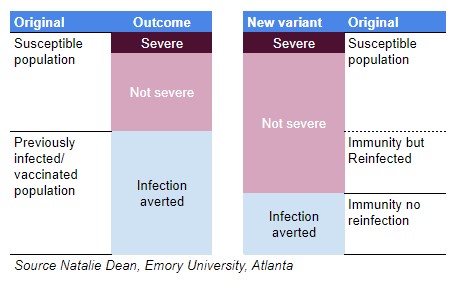
Is Omicron less severe than Delta? Still too early to tell
Since the Omicron variant was first identified as a variant of concern, everyone wants to understand the severity. An initial study in South Africa suggests Omicron is less severe, whereas a UK study finds no difference. My view? Still too early to tell.
There are two main published analyses of severity so far (neither peer-reviewed) based on substantial population-level data from South African and the UK. But even substantial data is still very early in this outbreak.
From South Africa, Discovery Health (South Africa’s largest private health insurance administrator, with 3.7 million clients) has analysed their customer data. Their comments are:
| The result shows that vaccinated individuals who received two doses of the Pfizer-BioNTech vaccine had 33% protection against infection, relative to the unvaccinated, in the first weeks of South Africa’s Omicron-driven fourth wave. This represents a significant drop from the 80% protection against infection afforded during the earlier period, probably on the basis of lower antibody susceptibility, following the extensive spike protein mutations in the Omicron variant.
Encouragingly, though, the result shows that these same vaccinated individuals who received two doses of the Pfizer-BioNTech vaccine had 70% protection against hospital admission in this same time period. While protection against hospital admission reduced from the highs of 93% in South Africa’s Delta-driven wave, 70% is still regarded as very good protection. … “Adults are experiencing a 29% lower admission risk relative to South Africa’s first wave of infection, dominated by D614G, in early 2020 after adjusting for vaccination status. Furthermore, hospitalised adults currently have a lower propensity to be admitted to high-care and intensive-care units, relative to prior waves.” |
Whereas from the UK, the Imperial College UK also looks at infectiousness, but also the severity. This analysis is based on a total of 208,971 S+ and 15,063 S- cases with complete data (this is using the PCR test, which has a specific “S-” to identify Omicron, which they have analysed as being very closely matched to full genetic analysis). For hospitalisation rates they reach this conclusion:
| Hospitalisation and asymptomatic infection indicators were not significantly associated with Omicron infection, suggesting at most limited changes in severity compared with Delta. |
This comment is based on an outcome that Omicron cases are 95% as likely to be in hospital as Delta cases, with a potential range around that number of (0.61-1.47).
So the South African study suggests that a vaccinated individual is more likely to be hospitalised by Omicron than Delta (30% chance of hospitalisation, compared with 7%) but that after adjusting for vaccination status, adults are experiencing a 29% lower admission risk compared with earlier waves, and once hospitalised, less likely to be seriously ill. The Discovery study doesn’t give statistical significance.
The UK study, on the other hand, suggests no change in hospitalisation rates.
Hospitalisation rates could look lower in these studies than in reality for a few reasons:
- It is still early days. The median delay between a person becoming ill with COVID-19 and requiring hospitalisation is six days (NSW Health). In a situation of rapidly growing cases, hospitalisation rates will lag case numbers considerably.
- The first people infected in a population are likely to be younger and healthier (more likely to be out nightclubbing or socialising generally), so less likely to have severe disease (both studies tried to correct for this).
- If you are more likely to get infected, but be protected by your prior immunity, the hospitalisation rates will look lower than they would be for a non vaccinated/non-infected person (more on this below).
Hospitalisation rates could also look higher in these studies than reality because:
- The hospitalisation rates appear to include everyone in hospital who is positive for COVID-19. Some of those are not ill with COVID-19, just happen to be in hospital for something else, and in a rapidly spreading situation, they could be a higher proportion of the total than they will be later.
This Twitter thread from Epidemiologist, Marc Lipsitch, was very helpful in understanding these two studies if you’d like to read more.
This picture from @nataliexdean explains one aspect of why analysing severity is hard, now that we have the complication of imperfect immunity (protecting against severe infection, but not reinfection).

To measure severity in a real outbreak, you need to look at the proportion of cases that end up being hospitalised or worse. Simple, right? Not quite. In the original outbreaks around the world, everyone was susceptible. So the severity of the original strain of SARS-CoV-2 could be measured based on the whole population. But now, everywhere around the world has some combination of previous infection or vaccination. In general, those who have been vaccinated are more likely to be those at higher risk of severe disease. So the Delta outbreaks in the UK in 2021 ended up with lower infections and less severe disease. But Omicron appears to infect everyone, whether they have some immunity (through vaccination or previous infection), or have no immunity. If those people who are somewhat immune end up with less severe disease, then it looks as if the variant is less severe overall.
But it might just be that vaccination averts the serious disease, but those without immunity end up just as sick. So Omicron could be less severe in everyone who gets infected. But if twice as many people get infected with Omicron as would have got infected with Delta, then Omicron might have half the severity but the same number of people get seriously ill.
So to get a really good measure of the severity of a disease, you need to understand the immunity status of all cases and compare them with severity. Both studies attempted to do this, but it isn’t easy.
For me, deep-diving into these studies confirms that you are much safer with vaccination, particularly if it is an mRNA vaccine, and especially if you have had a third dose and/or the previous infection. It does seem plausible that the disease could be a little less likely to cause hospitalisation than Delta was. But as I noted in my last post, hospitals could still be overwhelmed even with milder disease.
I’ve found that most commentators seem to gravitate to the study that confirms their initial views. I’ve tried not to be influenced by my initial thinking, but for transparency, my initial thought was that the new virus variant should be assumed to be equally severe unless proven otherwise.
| This article was originally published on Actuarial Eye by Jennifer Lang. Read it here. |
CPD: Actuaries Institute Members can claim two CPD points for every hour of reading articles on Actuaries Digital.






